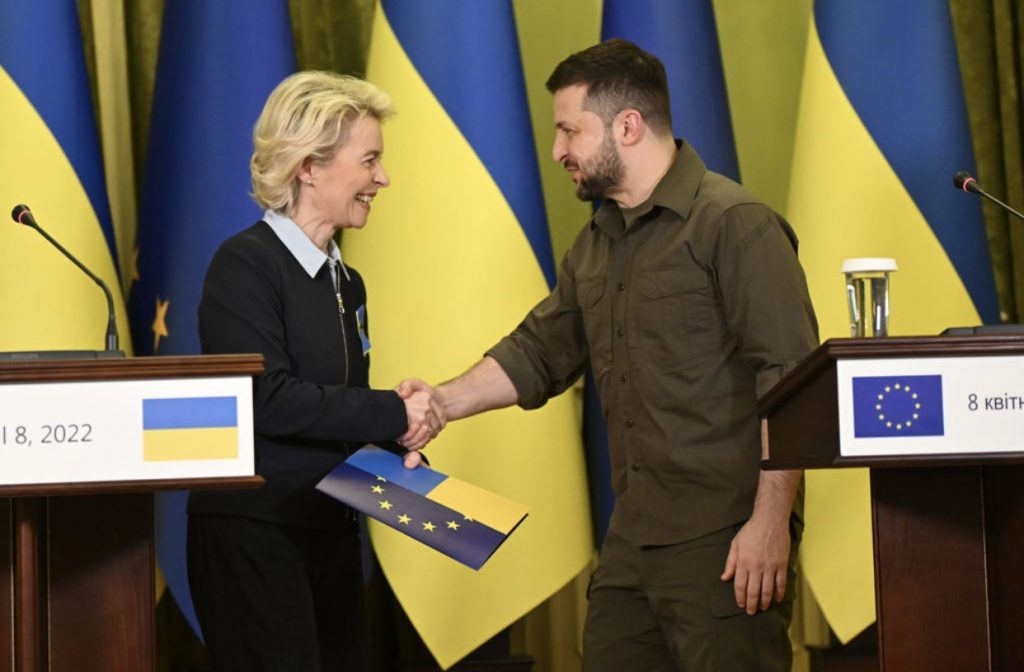Before the Russian invasion of Ukraine began on February 24, no one could have imagined that four months later the country would be granted candidate status for its integration into the European Union. But on Thursday, June 23, the leaders of EU member states decided to do just that for Ukraine and Moldova. The news had been expected for several days, and is seen in Kyiv as a victory and a step forward for the pro-imperialist government of President Volodymyr Zelenskyy — even if not in a climate of euphoria.
There is a long way to go between the status of an official “candidate” and that of a full EU member. Still, as French president Emmanuel Macron and many others have recognized, this is above all about sending a message to Russia and accelerating the dynamic of European imperialism’s eastward expansion.
A Message to Putin
The war’s first phase has been, for Russia, largely a failure, with Putin having to abort his initial plans. It has also been a disaster for Russia’s strategic objectives. Not only has NATO managed to close ranks (even if contradictions persist within the alliance), but it has also managed to win some new members (Sweden and Finland). Zelenskyy’s government has been strengthened and the Russian army has had its weaknesses exposed before the eyes of the world. Now, Ukraine is accelerating its accord with the West by obtaining official status as an EU candidate.
“When Zelenskyy announced Ukraine’s EU membership bid, many countries in western Europe were skeptical,” reports the Guardian. “Senior officials counted 10 member states that opposed candidate status for Ukraine, but the mood has shifted, as leaders feared being on the wrong side of history.”
An invasion of all of Ukraine and possible change of government by force would have created all sorts of social and political problems for Russia. Such a government would lack legitimacy on the international stage and would very quickly be ostracized by all the world powers. Its economy would collapse and questions would be raised about the political and economic viability of such a state. Even with the prospect of such instability, though, the Kremlin saw its military offensive as a way to block, at least temporarily, the growing alignment between Ukraine and the Western powers.
Russia’s military failure in the war’s first phase has had precisely the opposite consequences intended: it has sped up that rapprochement.
A Symbolic Decision, A Long and Uncertain Process
This is the context within which granting Ukraine official EU candidate status takes on its full meaning. Make no mistake: the process of integration will take a very long time if it ever really happens. That is what leaders of member countries in the Balkans stated at the end of Thursday’s meeting. For instance, Albanian president Edi Rama said, “Northern Macedonia is a candidate for 17 years, if I have not lost count, Albania since eight, so welcome to Ukraine … It’s a good thing to give Ukraine the status. But I hope that Ukrainian people will not make many illusions.”
There remains a lot of skepticism among European leaders regarding Ukraine’s integration, and even more with respect to creating a fast-track procedure. Two former Brussels-based technocrats, Hans Kribbe and Luuk van Middelaar, write in the Economist:
Ukraine deserves straight answers, not false promises. And the truth that EU leaders leave unspoken is that, although anchoring Ukraine in European structures is strategically important, there are equally strategic reasons why the EU should not be one of them.
It does not make sense for Ukraine to join the union before it secures NATO membership, which even Mr. Zelenskyy agrees is unattainable today. Security comes first, and the EU cannot provide it against Russia. EU member governments have a treaty obligation to assist each other in the case of armed aggression “with all means in their power,” but this form of solidarity, designed with terrorism or cyber-warfare in mind, does not deter a nuclear power. …
Europe needs to grow into a geopolitical force, capable of working with America to stabilize the European region. But the accession of Ukraine, as well as states such as Russia-friendly Serbia, would risk leaving the club even more divided and hamstrung than it is today.
Thursday night’s decision is certainly a step toward strengthening Ukraine’s pro-Western tendencies and the eastward expansionism of European imperialism. But there is still a long way to go before Ukraine becomes an EU member. Indeed, beyond the speeches rejoicing about the “progress of democracy” in Ukraine, the reality is that the Ukrainian state — a kleptocracy largely dominated by oligarchs — remains riddled with corruption. On top of that, it is a country at war, with a large swath of its territory occupied by a hostile power that in recent days is advancing securely in the Donbas.
All of this will make Ukraine’s rapid integration into the EU very difficult. The war itself, and the international balance of power, will be decisive for further developments. Meanwhile, none of the scenarios for Ukraine today represent, in any way, a progressive alternative for the country.
First published in French on June 24 in Révolution Permanente.
Translation by Scott Cooper











